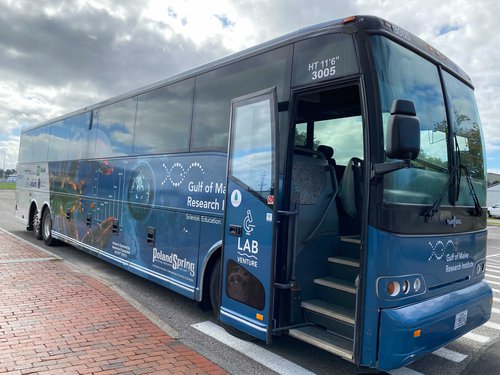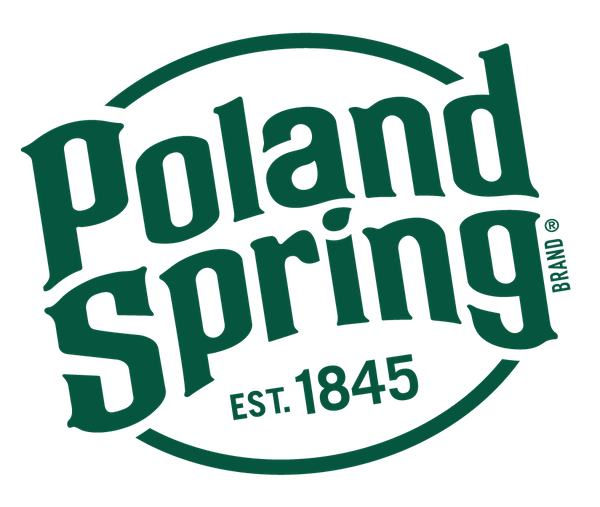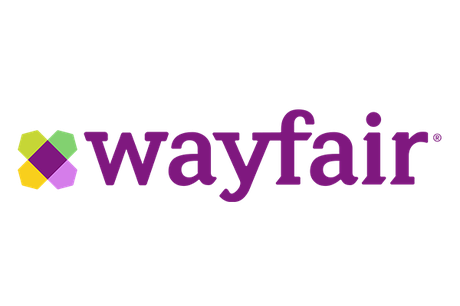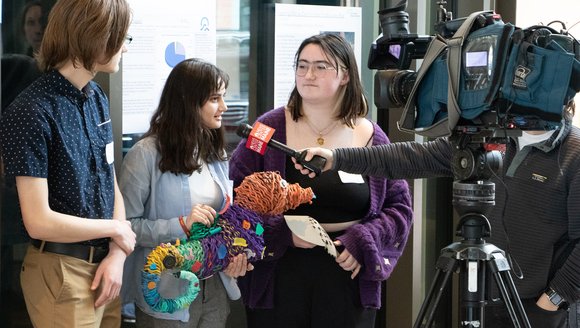2023 – 24 Education Impact Report: Building Integrated Learning Experiences
Reports | Aug 20, 2024
Our education team strives to inform and inspire the next generation of climate scientists by engaging students in authentic science and supporting educators working to do the same. By helping students develop and deepen confidence, competence, and curiosity in science, we aim to position them as lifelong learners who will support healthy ocean ecosystems, sustainable seafood practices, and the blue economy workforce.
Read on to see some of the ways our education team made an impact across the state and beyond in the 2023 – 2024 school year.

At GMRI, our education team uses an integrated approach to support STEM (science, technology, engineering, and math) learning in the classroom, the lab, the field, and beyond. Our programs build on and complement each other to strengthen fundamental STEM skills – including critical thinking, data literacy, problem solving, and science communication – across a variety of learning environments. Whether examining plankton under a microscope, collecting data on invasive species in their local forests, or sharing their findings through writing and peer-review, our students learn that there are many ways to be a scientist.
In the 2023 – 24 school year, we developed and deepened connections between students, educators, and their local ecosystems to advance lifelong learning and science driven action. We invite you to learn more about our programs, celebrate our recent accomplishments, and support our efforts to build integrated learning experiences across the Gulf of Maine.
Numbers at a Glance
When you look at the numbers, our education team's impact is clear.
Students engaged
Across our education programs, we supported STEM learning for thousands of students.

Educators supported
Ensuring that educators have the resources, curriculum, and connections they need is a top priority of our education team.

School and Organizational Partners
Our work supports schools and organizations, spanning formal (classroom) and informal (community) educators — reaching students in every step of their learning pathways.

Cross-program participation
Half of surveyed educators engaged in 3 or more programs and offerings from GMRI.

LabVenture
LabVenture – our cornerstone education program – provides Maine’s 5th – 6th grade students with accessible, immersive STEM education that sparks their interest in science and equips them with the confidence, competence, and curiosity needed to engage in scientific discovery. LabVenture brings students to our Cohen Center for Interactive Learning, where they participate in a series of activities exploring real data and real questions, including: How is the Gulf of Maine changing? How are species responding? What do these changes mean for our region’s ecosystems, economies, and communities?
We are proud to have reached 68% of Maine’s 5th – 6th grade cohort through LabVenture in the 2023 – 24 school year, including students from all 16 counties. As part of our commitment to upholding equitable access to STEM education, we also reached every eligible student from Lewiston Public Schools and Portland Public Schools — both of which have significant New Mainer or immigrant populations — as well as every eligible student in the Wabanaki school system. We are striving to enhance the diversity demonstrated in LabVenture so that the experience feels relevant to every student who steps foot in the Cohen Center. In this effort, we recently developed a video where four Mainers from diverse backgrounds share their climate observations. By showing this video at the end of each LabVenture visit, we hope to challenge preconceived notions of the scientific field and demonstrate that everyone can advance meaningful scientific investigations and solutions.
LabVenture Numbers at a Glance

Students engaged
In the 2023 – 24 school year, we supported STEM learning for a diverse range of students across the state of Maine.

Counties served
The LabVenture learning experience reaches students from all of Maine’s 16 counties.
Schools served
Schools throughout the state joined us in our Cohen Center for Interactive Learning this year.

Improved climate learning
The majority of surveyed educators agreed or strongly agreed that LabVenture supported learning about climate and ecosystem change.

This visit was very meaningful to me because I have always wanted to meet a scientist. I loved that we had the opportunity to be hands-on and do research by looking at real lobsters. You can’t even guess how quickly I got out of bed this morning, I was so excited to go!
Jasper, LabVenture student Oxford County
Our school is part of a larger district in rural, interior Southern Maine. Many of our students do not have a lot of opportunities to visit the seaside, or even Portland. [LabVenture] gives them that opportunity, and also gives them a greater appreciation of how interconnected our world is and the impact we can have on the world around us.
Emily Hodgman Educator Massabesic Middle School
Statewide LabVenture Supporter
Poland Spring is a statewide partner in delivering LabVenture through their Good Neighbor grant program. Poland Spring supports GMRI to help foster the next generation of water stewards.
Community Science: Investigating Local Ecosystems
In order for science learning to have meaningful, lasting impacts, we must help students relate science to the world around them. Our community science program achieves this by leading students through immersive investigations of vernal pools, intertidal zones, forests, and other local ecosystems in their communities. Through our community science curriculum, students not only collect data but also contribute their findings to real, ongoing research projects led by expert scientists via our Ecosystem Investigation Network. Students also develop and deepen connections to their immediate surroundings and the broader community of scientists, educators, and climate leaders working to understand and steward the Gulf of Maine.
In the 2023 – 24 school year, we introduced new community science curriculum focused on coastal flooding and sea level rise, worked with the Ash Protection Collaboration Across Wabanakik to develop an ash inventory and monitoring project, and engaged Lewiston Public School’s entire 7th grade class (~300 students) through our vernal pool community science project. In total, we collected over 1,470 data points that will be used to advance our understanding of ecosystems in the Gulf of Maine’s watershed.
Community Science Numbers at a Glance

Students engaged
We reached over 4,500 students in their communities to ensure they can conduct scientific inquiries into the ecosystems that matter to them.

Data points collected
Whether they were counting hemlock woolly adelgid infestations or submitting sea level rise observations, students collected an impressive amount of data.

Contributing schools
Schools throughout Maine and beyond contributed data to ongoing, real-world research projects.
Educators supported
Our education team provided professional development opportunities for educators looking to connect their students to authentic scientific work.

Making a difference
The majority of surveyed students reported believing that their community could make a difference in their local environments by participating in community science.

Meaningful science engagement
Nearly all surveyed educators agreed or strongly agreed that the program helped introduce meaningful and relevant science learning experiences in their classrooms.

I learned more about all the things in nature that interact to make an ecosystem.
Anonymous Student Scientist
[The Community Science Program] builds students’ understanding and confidence to tackle climate change impacts while knowing that adults and other students are working on solutions.
Community Science Educator
Findings from the Field
Finding from the Field (“Findings”) is a peer-reviewed scientific journal featuring environmental investigations conducted and written by middle and high school students. Launched in 2017 in collaboration with a community of student scientists and teachers across Maine and New Hampshire, Findings gives students the opportunity to engage in and communicate about real scientific questions. Through an immersive scientific writing experience, an authentic peer-review process, and an in-person research symposium, Findings encourages students to build connections with their peers, the scientific community, and ecosystems in the Gulf of Maine.
In the 2023 – 24 school year, we engaged 1,261 students in Findings across the writing, review, and publication process. We published Findings: Volume 7 featuring 25 student publications from 23 schools across Maine and New Hampshire, including many schools that participate in Findings year after year. We also hosted the first in-person Findings research symposium in March 2024, which brought together scientists, educators, and over 50 students to share their scientific observations and discoveries.
Findings Numbers at a Glance

Students engaged
Students work together to conduct, reflect on, and share scientific investigations in a peer-reviewed science journal.

Participating schools
Students from 60 schools in Maine and New Hampshire participated.

Student publications
Student contributions to the journal undergo a process of peer and editorial board review before publication.
Educators supported
Our education team provided professional development opportunities for educators looking to connect their students to authentic scientific work.

Presenting students
Students gave presentations to their peers, teachers, and professional scientists at the first in-person Findings symposium in March 2024.

Improved observation skills
The majority of surveyed educators agreed or strongly agreed that Findings equipped them to support youth in developing scientific observation skills.

I plan on going into science for my career, so being able to do something outside of school like this is very helpful to get me ready and to get feedback to make me better.
Student Scientist Baxter Academy
Supporting Educators to Support Students
We provide professional development, networking opportunities, and other resources across our programs to help educators create hands-on science experiences for students. In addition to the programs detailed above, we support the growth of science education in and beyond Maine through Connected Learning Ecosystems (CLEs), which are peer communities of formal and informal educators working together to support STEM learning and build climate literacy. We also offer free, high-quality science curriculum through our Learning Resource Hub, including modules on local seafood in Maine schools, maple sugaring in a changing climate, and hemlock woolly adelgid infestations. Whether educators participate in a single program or take advantage of all the resources we have to offer, we work to ensure that they feel supported, connected to their peers, and empowered to bring authentic science into their classrooms, libraries, and other learning spaces.
Numbers at a Glance

CLE communities
Since 2016, we’ve grown and sustained educator communities in five Maine regions.

Increased confidence
All surveyed educators agreed or strongly agreed that participation in a CLE increased their confidence in bringing new learning experiences to their programs or classrooms.
Curriculum modules
Our Learning Resource Hub offers 13 learning resources to support educators as they engage their students in authentic, relevant science.

Increased climate literacy
Most of the educators we surveyed agreed or strongly agreed that our curriculum modules helped them build understanding of climate change impacts.

This was my first CLE experience and I found it incredibly invigorating and helpful. As a librarian, it was really useful to meet other educators and learn about what they are doing and how we might work together.
Samantha Cote Windham Public Library
I loved meeting new people who want to work with community partners. Sometimes it feels like a huge lift to find people to work with, let alone plan a workshop/lesson, so this was very helpful in making those connections!
Leah McCluskey Maine 4-H
Our Impact
By engaging students in integrated science learning experiences across our educational programs, we aim to strengthen their STEM skills, spark a lifelong interest in science, and empower them to become the marine scientists, environmental stewards, and climate leaders of the future. We’re deeply appreciative of the partners who make this work possible, including classroom teachers, informal educators, community organizations, and of course, our donors and supporters.
Appendix: Supporters
General Education
- John T. Gorman Foundation
- Kettering Family Philanthropies
- Margaret E. Burnham Charitable Trust
- The Onion Foundation
- The Robert and Dorothy Goldberg Charitable Foundation
LabVenture
- Poland Spring
- Edwin S. Webster Foundation
- Tom's of Maine
- Wayfair
- Bank of America Charitable Foundation
- Bath Iron Works
- Bath Savings Institution
- Charles C. Butt
- Cianbro Charitable Foundation
- Clark Insurance
- George P. Davenport Trust Fund
- Harold H. Dudley Charitable Fund
- Hyman Family Foundation
- Katahdin Trust Company
- Kennebunk Savings Bank
- Kleinschmidt Group
- L.L. Bean
- Machias Savings Bank
- Marr-Anderson Family Foundation
- MMG Insurance
- Norway Savings Bank
- onsemi
- Pond Family Foundation
- Portland Pipe Line Corporation
- R.H. Reny’s, Inc.
- RBC Wealth Management
- Reny Charitable Foundation
- Robert G. and Jane V. Engel Foundation
- Saco & Biddeford Savings Institution
- Skowhegan Savings Bank
- TD Charitable Foundation
- The Old Bug Light Charitable Foundation
- The Phineas W. Sprague Memorial Foundation
- The Seth Sprague Educational and Charitable Foundation
- The Windover Foundation
- Wallstone Fund of the Maine Community Foundation at the recommendation of Manny Morgan
- WesaDoe Fund
We also work closely with a team of committed partners and vendors who are critical in executing our program: Cyr Bus Lines, Custom Coach, and Upswell.
- Statewide Supporter
- Lead Supporters
- Additional Supporters
In Honor of Charlie Miller
In memory of our former board chair and champion of our work, Charlie Miller, his family established the Charles E. (Charlie) Miller Fund for Environmental Education in Maine to ensure the longevity of LabVenture and its impact on Maine's future STEM leaders. Thank you to Charlie's loved ones who have helped us honor his legacy in this special way.
Findings from the Field
- Davis Family Foundation
- Unum







